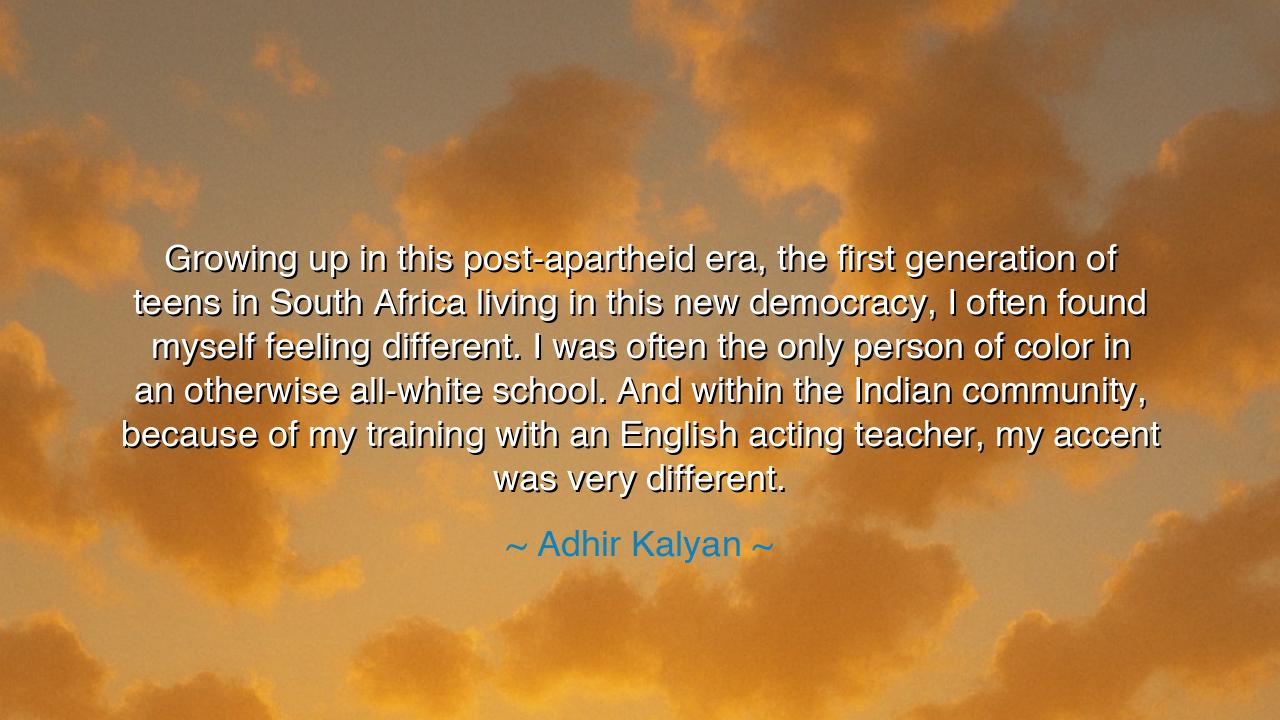
Growing up in this post-apartheid era, the first generation of
Growing up in this post-apartheid era, the first generation of teens in South Africa living in this new democracy, I often found myself feeling different. I was often the only person of color in an otherwise all-white school. And within the Indian community, because of my training with an English acting teacher, my accent was very different.






Adhir Kalyan once reflected: “Growing up in this post-apartheid era, the first generation of teens in South Africa living in this new democracy, I often found myself feeling different. I was often the only person of color in an otherwise all-white school. And within the Indian community, because of my training with an English acting teacher, my accent was very different.” These words bear the weight of history, the voice of a soul shaped by change, by division, and by the longing to belong. In them is heard not only the story of one man, but the cry of a generation born into freedom yet still wrestling with the shadows of the past.
The origin of this quote lies in South Africa’s great transformation—the fall of apartheid and the birth of democracy. For centuries, walls of race and separation had defined who one could be, where one could walk, how one could dream. Kalyan belonged to that first generation of youth who stepped into schools and institutions once barred to their parents. Yet freedom did not erase difference overnight. To be the lone student of color in a white classroom was to feel both the promise of a new world and the isolation of being marked by history.
This struggle is not unique to South Africa. The ancients, too, knew what it meant to live between worlds. Think of the Roman philosopher Seneca, born in Spain but educated in Rome. He carried in himself the tension of being both insider and outsider, belonging to the empire yet always marked by origin. Or recall Alexander the Great, who, though Macedonian, sought to merge Greek and Persian, East and West, yet was never fully accepted by either. Kalyan’s experience of being caught between communities, his voice too “English” for his own, too “different” for another, is part of this eternal human tension.
History gives us many such mirrors. Consider W.E.B. Du Bois, who described the “double consciousness” of being African American: seeing oneself through the eyes of a society that treated one as lesser, while also carrying the pride of heritage. Du Bois, like Kalyan, lived with the burden of difference, yet transformed it into wisdom. He showed the world that identity is not weakness but strength, forged in the fire of struggle. To be “different” is not to be broken; it is to be broadened, to carry within oneself more than one world.
The meaning of Kalyan’s words is therefore profound: he reveals the loneliness of being between identities, yet also the richness it brings. His accent, his education, his heritage—each made him stand apart. What seemed a barrier became, in truth, a source of uniqueness. For those who dwell between worlds are often the ones who can see most clearly, who can bridge divides, who can carry understanding where others see only separation. What isolates can also empower, if the soul learns to embrace it.
The lesson for us is clear: do not shrink from your difference, for it is the mark of your strength. The world may seek to press you into sameness, to demand that you belong fully here or there, but the one who walks between paths often carries wisdom that neither side possesses. If you feel out of place, remember: so too did prophets, poets, and leaders across history. They were seldom at ease in one camp, for their calling was to walk at the edge, where new worlds are born.
In practice, this means honoring your own voice, even when it trembles. It means carrying your accent proudly, knowing it tells a story of journey and growth. It means standing firm in classrooms, workplaces, and communities where you feel like an outsider, remembering that your presence itself is proof that walls have been broken. And it means turning your difference into dialogue, your strangeness into strength, your in-betweenness into a bridge for others.
Therefore, remember Adhir Kalyan’s wisdom: “I often found myself feeling different.” These words, though spoken with humility, hold power. They remind us that being different is not a curse but a calling. For the world is not healed by those who fit comfortably within its old divisions, but by those who dare to stand apart, to live between, and to show that identity can be both many and one. Such souls carry the future within them, as surely as the first free generation of South Africa carried the hope of a new dawn.






AAdministratorAdministrator
Welcome, honored guests. Please leave a comment, we will respond soon